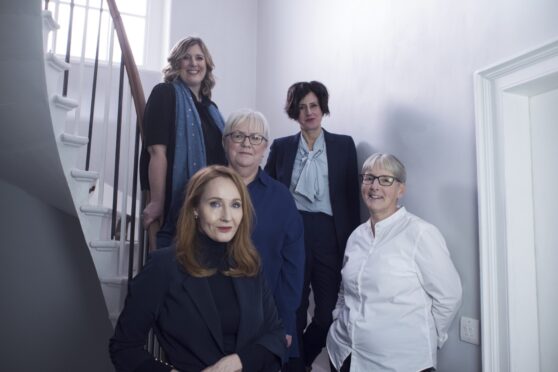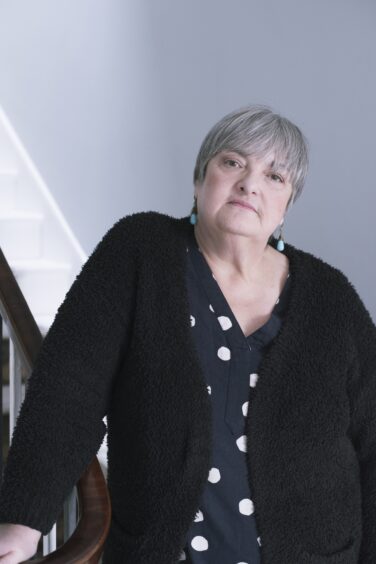
A year on from the opening of JK Rowling’s women-only rape centre, thousands of victims have reached out for help.
Despite initially causing raised eyebrows over its insistence on creating a women-only safe space – under the watchful eye of CEO Isabelle Kerr – Beira’s Place has simply, quietly and effectively gone about the age-old business of women helping other women.
A veteran of more than four decades protecting and sheltering women suffering sexual violence and domestic abuse, Isabelle Kerr was so passionate about supporting JK Rowling’s decision to fund a women-only centre that she came out of retirement to help set it up.
Busy since doors opened
Speaking for the first time since Beira’s Place opened, Isabelle, 67, said: “The whole ethos of the place took me back to the grassroots of the women’s movement in Scotland, when women helped other women stay safe in an act of basic feminism.
“Back in the early-1970s, they just had a few mattresses on the floor of a flat in Glasgow. But that meant there was always a safe roof over the women’s heads along with a core of strong supportive feminists to help survivors overcome the trauma of male violence.
“It was how women dealt with the practicalities brought about by the age-old problem of domestic abuse and sexual violence. I’m saddened to say very little has changed through the decades, which is why Beira’s Place has been busy from the moment we opened our doors.”
Isabelle is the no-nonsense, straight-talking Glaswegian mum who travelled to Cyprus to train police officers following their blundering over the 19-year-old British woman arrested and charged with making false allegations after she reported being gang raped by a group of men in 2019.
She also helped the Seychelles and Nigeria to train their police and criminal justice system over their woefully inadequate response to violence and sexual crime against women and girls.
Isabelle said: “Men’s violence towards women continues unabated around the world. Justice systems continue to fail women with sentencing that rarely reflects the damage and trauma inflicted, despite these crimes carrying the possibility of a life sentence.
“When I see some of the sentences being meted out here in Scotland – community service for rape – and as JK Rowling perfectly described the under-25 sentencing guidelines as ‘the first one is for free’, it’s quite clear these failures leave perpetrators believing these crimes are almost risk-free.
“We still have a culture where victims are blamed because of what they wear, where they went or what they did rather than holding the perpetrator to blame. It’s soul destroying.”
Isabelle blames the porn industry for desensitising society to sexual violence towards women and young girls. And she says porn is so easily accessible, young boys quickly become hooked and look for more extreme behaviours which they then mistakenly believe is how they should behave. She said: “Sexual violence and the abuse of women and girls has become so commonplace that it has almost lost the power to shock.
“The power of the multi-million-pound porn industry is so massive it is now affecting how young children behave towards each other. Even very young children have phones that can easily access porn. That’s why we are seeing such sexual violence towards young girls.”
Beira’s Place was named after the Celtic goddess of winter by JK Rowling. Isabelle said: “As an abuse survivor, she (JK Rowling) knew instinctively what was needed. She had already spent many years helping fund sexual violence support services. Jo was determined to do something special, to launch the only safe space in Scotland that could guarantee there were only women, no men.
“Our phones started ringing the day we opened. They haven’t stopped. We’ve helped almost 2,000 callers looking for support. Over 250 survivors have used our safe space. Many told us they would not want to use the service if men were on the premises, either because they have been so traumatised or for cultural reasons.
“That is why we are unashamedly a service by women for women. All our staff are women. We don’t allow any men on the premises during the time we see clients.”
But that does not mean Beira’s Place will not help trans women.
Isabelle said: “We know it will have taken a great deal of courage for any survivor to make that call, so we give telephone support. Once we’ve done that, we suggest face-to-face services that would better suit them.
“When Beira’s Place first opened, there was a little controversy because of the women-only issue. But once people have seen what we are doing, offering a service that is not being offered elsewhere, the police, government and other organisations have been happy to both work with us and refer women for help.”
Violence towards women
Isabelle warns that much more needs to be done about identifying the escalating cycle of violence towards women. She said: “We don’t live in the kind of society where women and girls are safe from predators, stalkers, rapists and men who use coercive control to trap the vulnerable. We live in a society where women and girls have lost so much trust and hope in our criminal justice system that only 10% of violence and sex crimes are ever reported.
“We live in a society where the criminal justice system and process drawn out over two or three years is often more a punishment for the victim than the perpetrator.
“That is the heart of the problem.
“When a system breaks down so badly like that, there is little point in tinkering with it around the edges.
“It’s time the whole system was rewritten, and specialist courts with the expertise to deal more effectively with sex crimes and violence against women and girls were introduced.
“Until we take these crimes more seriously, very little will change.”

Enjoy the convenience of having The Sunday Post delivered as a digital ePaper straight to your smartphone, tablet or computer.
Subscribe for only £5.49 a month and enjoy all the benefits of the printed paper as a digital replica.
Subscribe